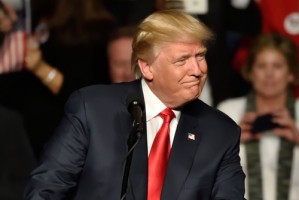Acting on a campaign promise, Trump withdraws from Trans-Pacific Partnership

President Donald Trump. Evan El-Amin / Shutterstock, Inc.
President Donald Trump on Monday signed an executive order to withdraw from the Trans-Pacific Partnership, saying his decision to abandon the trade deal is “a great thing for the American worker.”
The order is “mostly symbolic,” report NPR and the Wall Street Journal (sub. req.), because the deal with 11 Pacific Rim nations was never ratified by the United States. The pact had become increasingly controversial, among both Democrats and Republicans. The New York Times and the Washington Post also covered Trump’s order.
The agreement—which did not include China—had taken 10 years to negotiate. The aim of the agreement, according to the Wall Street Journal, was to pressure China by eliminating many trade barriers with the participating nations, including Japan, Canada, Mexico, Australia and Vietnam. The deal would have also established rules for settling trade disputes and protecting intellectual property.
Backers of the agreement said it would bring economic benefits through increased trade and give the United States a leading role in setting trade rules. Detractors said the deal would create job losses, decrease pay for low-income workers, boost prescription drug costs, and allow unsafe food to be imported into the United States.
Also controversial were provisions for arbitration of complaints by corporations who claim a participating country has harmed its business interests. Critics say the provision, which has been used in some form in other international trade agreements, constrains the ability of countries to set environmental, health, safety and financial regulations.
Trump may turn next to renegotiation of the North American Free Trade Agreement, the controversial deal with Mexico and Canada.
Related article:
ABA Journal: “Trans-Pacific Partnership raises question: How should governments and corporations resolve disputes?”



